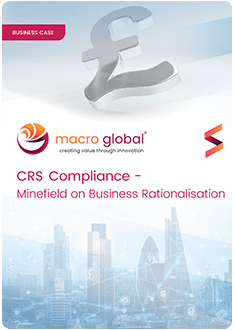BUSINESS CASE
CRS Compliance – Minefield on Business Rationalisation
Macro Global assisted one of our customers with regulatory compliance via our CRS Stride, Common Reporting Standard Reporting Platform, allowing them to easily adapt in real-time with maximum operational efficiency.
Regulators around the world are active and stringent in monitoring financial firms to combat money laundering, terrorism financing, and tax evasion through foreshadowing rules. Due to the implementation of the OECD’s Common Reporting Standard (CRS) and the Foreign Account Tax Compliance Act (FATCA), tax transparency has become increasingly important for financial organisations.
Financial institutions must have comprehensive reporting systems in place to monitor and adhere with the CRS and FATCA mandated legislations by reporting accurate and consistent data to avoid brand reputational damage, investigation, restrictions, remediation, and penalties from tax authorities.
AEOI regimes around the globe are competing with an economic crisis caused by the COVID-19 epidemic, making it even more critical for authorities to use information from tax transparency projects to mobilise tax revenues and combat tax evasion. As a result, financial institutions must comprehend the goals and key requirements of accurate CRS reporting.
The cost of additional regulation represents the financial services industry’s continuously increasing compliance overheads after the 2008 financial crisis. In this business case, we will explore the problems that financial institutions have when it comes to CRS reporting and how Macro Global has assisted FIs with regulatory compliance using CRS Stride, allowing them to instantly adjust in real-time while maintaining optimum operational efficiency.
Related Resources
Video
CRS StrideAEOI / HMRC CRS & FATCA Reporting Solution
Business Case
Modern Taxation – An Early Adoption of CRS Stride Reporting Solution
Business Case
CRS Compliance - Minefield on Business Rationalisation
White Paper


















